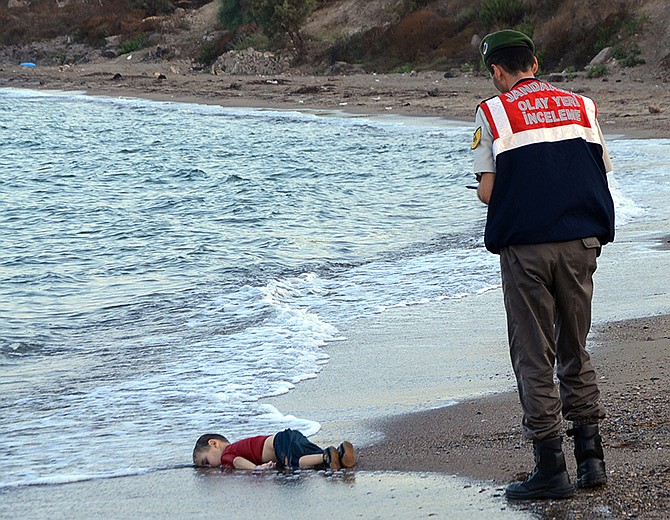ANKARA, Turkey (AP) - He is one among many, far too many. But the plight of one boy, washed up like a piece of debris on a Turkish beach, has focused the world's attention on a wave of war-and-deprivation-fueled migration unmatched since World War II.
Aylan Kurdi, 3, was found on a Turkish beach in sneakers, blue shorts and a red shirt after the small rubber boat he and his family were in capsized in a desperate voyage from Turkey to Greece.
Aylan died along with 5-year-old brother Galip and his mother, Rehan, leaving their distraught father, Abdullah, to cope with his sudden, overwhelming loss. He said Thursday he wanted one thing and one thing only: to sit by the graves of his wife and children.
"My kids were the most beautiful children in the world, wonderful. They wake me up every morning to play with them. They are all gone now," he said.
A Canadian legislator said the family, fleeing the conflict in Syria, had been turned down in a bid for legal entry to Canada even though it had close relatives there offering financial backing and shelter, but Canada's Department of Citizenship and Immigration later denied that assertion.
"There was no record of an application received for Mr. Abdullah Kurdi and his family," the department said in a statement, indicating a bid for another member of the family, Mohammad Kurdi, had been returned as incomplete.
Tima Kurdi of Vancouver, who is Abdullah's sister, initially told Canadian media the family had embarked on the perilous boat journey only after its bid was rejected. She later said, however, no formal request for refugee status had been made on Abdullah Kurdi's behalf, saying one was filed, and rejected, on another relative's behalf. She also gave a different transliteration for the boys' names, calling them Alan and Galib.
Accounts of events changed several times Thursday as information flowed in from several parts of the world.
Canadian Prime Minister Stephen Harper said some early accounts contained inaccurate information.
Describing the tragedy, Abdullah Kurdi said the overloaded boat flipped over moments after the captain, described as a Turkish man, panicked and abandoned the vessel, leaving Abdullah as the de facto commander of a small boat overmatched by high seas.
"I took over and started steering. The waves were so high and the boat flipped. I took my wife and my kids in my arms and I realized they were all dead," he said.
In a police statement later leaked to the Turkish news agency Dogan, Abdullah Kurdi gave a different account, denying a smuggler was aboard. However, smugglers often instruct migrants that if caught they should deny their presence and it was unclear whether he had been trying to protect a smuggler's identity in his statement to police.
Abdullah Kurdi said the boat, headed for the Greek island of Kos, was only at sea for four minutes before the captain abandoned the vessel and its 12 passengers.
The route between Bodrum in Turkey and Kos, just a few miles, is one of the shortest from Turkey to the Greek islands, but it remains dangerous. Hundreds of people a day try to cross it despite the well-documented risks.
Tima Kurdi's husband, Rocco Logozzo, told the Canadian Press Abudllah Kurdi told his sister both boys were wearing lifejackets when the boat capsized but the protective gear somehow slipped off when the boat flipped.
He said the family had enough money and room in his home to have provided for their relatives in Syria but hadn't been able to because the bid was rejected by a system that was designed to fail.
The family lost all hope when the application was denied in June and made the "bad" choice to try to get to Europe by boat, he said.
Earlier, Tima Kurdi had told the Ottawa Citizen the application for refugee status had been rejected. She later contradicted this account when she said no formal bid for refugee status had been made.
Her relatives lived in the Syrian town of Kobani, which was devastated by battles between Islamic State militants and Kurdish fighters, said Canadian lawmaker Fin Donnelly.
He had told The Canadian Press he had submitted the application on the family's behalf.
Canadian immigration authorities rejected the application, in part because of the family's lack of exit visas for their departure from Turkey and their lack of internationally recognized refugee status, the aunt told the Ottawa Citizen.
The plaintive photograph of lifeless Aylan Kurdi, seen around the world, has highlighted the desperation of those risking their lives to try to reach Europe, sparking fresh calls for countries to do more to ease their passage.
In Britain, U.N. refugee agency representative Laura Padoan said publishing the photos may bring a major change in the public's perception of the crisis.
"I think a lot of people will think about their own families and their own children in relation to those images," she said. "It is difficult for politicians to turn their backs on those kind of images and the very real tragedy that is happening."

